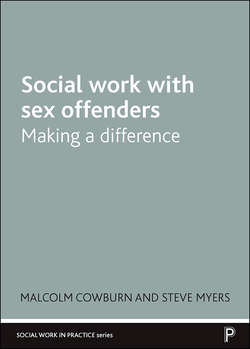Читать книгу Social Work with Sex Offenders - Cowburn Malcolm - Страница 19
На сайте Литреса книга снята с продажи.
Offender denial
ОглавлениеThere is a long history in the literature relating to practice1 with sex offenders of considering denial (see Salter, 1988; Briggs et al, 1998). Such has been the central importance given to denial and taking responsibility for offending that it has had a high profile in treatment programmes, both in the US (McGrath et al, 2010) and the UK (Beech and Fisher, 2004). However, recently, its relevance to sex offender treatment has been questioned (Yates, 2009; Ware and Mann, 2012). Nevertheless, while the centrality of denial and responsibility within treatment programmes may be contested, it remains an issue for social workers, who frequently encounter sex offenders outside of formal therapeutic settings.
Reflective exercise: Identifying and analysing minimisations
Ware and Mann (2012, p 281, emphasis added) ‘use the term denial to mean categorical rejection of the conviction, and the term minimization to refer to the common tendency to omit or underplay certain aspects of the offending or its consequences’.
In this exercise, we would like you to reflect on something that you have done that you feel ashamed of.
1. Can you identify ways in which you minimise your responsibility for this action? Write out things that you say to yourself and/or other people.
2. Can you identify ways in which you minimise the consequences of the action? Write out things that you say to yourself and/or other people.
Having written out these phrases, you can begin to identify patterns in what you are saying to yourself or to others (eg blaming others for what you have done [external attributions] or blaming something inside you [internal attributions]).
3. How do these phrases help you to cope with your day-to-day life? (What function do they serve?)
If you have some experience in working with sex offenders, repeat the exercise while thinking of how an offender spoke of his offences.
For social workers, encountering denial and minimisations from a sex offender can be difficult. A key issue is to listen to what is being said and to check that it has been recorded accurately. In this way, the worker dispassionately collects detailed information. These data are particularly important in assessing sex offenders and the risks that they may pose (see Chapter Five). The emotional impacts of listening and recording without challenging must be acknowledged and discussed in supervision, peer support, therapy or in other supportive relationships (see Chapter Seven).
